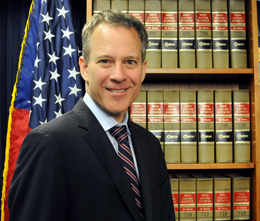 Narco Freedom defrauded Medicaid and exploited its patients by forcing them to attend excessive and medically unnecessary substance abuse treatment services
Narco Freedom defrauded Medicaid and exploited its patients by forcing them to attend excessive and medically unnecessary substance abuse treatment services
Attorney General Eric T. Schneiderman announced today the guilty plea and a multi-million dollar civil settlement with Narco Freedom Inc., a Bronx-based not-for-profit provider of substance abuse treatment, for its participation in a criminal enterprise. At the time of its indictment in 2015, Narco Freedom was an enrolled Medicaid provider that received nearly $40 million annually in taxpayer-funded reimbursement. In its plea and a parallel State civil settlement agreement, Narco Freedom admitted today to stealing millions of dollars from the Medicaid program through the actions of its former chief executive officer Alan Brand and subsequent chief executive officer Gerald Bethea. In New York State Supreme Court, Bronx County, Narco Freedom, pled guilty to one count of Enterprise Corruption, a class B felony, three counts of Grand Larceny in the First Degree, a class B felony, and two counts of Offering a False Instrument for Filing the First Degree, a class E felony.
“Narco Freedom operated a years-long criminal enterprise that ripped off taxpayers and took advantage of New Yorkers in need of substance abuse treatment,” said Attorney General Schneiderman. “Using Medicaid to further one’s bottom line at the expense of those who are struggling with abuse or addiction is shameful.”
The long-term investigation by the Attorney General’s Medicaid Fraud Control Unit (“MFCU”) culminated in a March 2015 indictment charging Narco Freedom and numerous executives with operating a criminal organization that defrauded Medicaid and syphoned funds meant for its patients for the enrichment of their own lifestyles. That indictment included charges against Narco Freedom, the former chief executive Alan Brand, his son Jason Brand, Gerald Bethea, the chief executive at the time, and the controller Richard Gross. The Attorney General also filed a civil action seeking asset forfeiture and other remedies, including treble damages and penalties under the New York State False Claims Act. The indictment and civil action alleged that Narco Freedom stole at least $27 million from the Medicaid program by violating patients’ rights, submitting claims for excessive services, and by operating an unregulated residential treatment program. The arrests and civil action stopped the illegal business practices of Narco Freedom that exploited the Medicaid program and thousands of Medicaid recipients, resulting in many millions of dollars in savings to Medicaid.
As part of its plea and civil agreements, Narco Freedom acknowledged that it stole from Medicaid by seeking reimbursement for excessive and medically unnecessary services that it had required its patients to receive. In addition to operating substance abuse treatment programs, Narco Freedom provided transitional housing. Today, Narco Freedom acknowledged that it violated the rights of its residents and illegally conditioned residency on attendance at its own substance abuse treatment program. Narco Freedom further admitted to filing false statements with various state agencies, including the New York State Department of Health and the Office of the New York State Attorney General, Charities Bureau, in efforts to deceive and defraud these agencies. These filings were filed and signed by Alan Brand and the controller of Narco Freedom, Richard Gross. Prosecutions against Narco Freedom’s former executives remain pending.
Soon after Narco Freedom was indicted, a federal district court judge appointed a temporary receiver to take control of its finances and run the organization. In September 2015, Narco Freedom ceased treating patients and transferred their care to other substance abuse treatment providers. Narco Freedom filed for bankruptcy in January 2016. A bankruptcy trustee will take steps to dissolve Narco Freedom pursuant to the State’s not-for-profit corporation laws. Earlier this month, the bankruptcy court approved a $118 million settlement to settle Narco Freedom’s outstanding government claims, including those of New York State and the federal government, though the precise amount to be distributed to the State in the bankruptcy proceeding is yet to be determined.
In court today, Supreme Court Justice Steven L. Barrett sentenced Narco Freedom to a conditional discharge.
The Attorney General’s office has worked closely with various state agencies to ensure the continuity of care for all of the patients who used Narco Freedom’s services. In particular, the Attorney General would like to thank the New York State Office of Alcoholism and Substance Abuse Services, the Office of the New York State Medicaid Inspector General, the New York State Department of Health, the Human Resources Administration of the City of New York, and the Civil Division of the United States Attorney’s Office for the Southern District of New York.
Please report suspected Medicaid fraud in New York State to the Attorney General’s Office at 800-771-7755.
The investigation was led by Senior Investigator Albert Maiorano and Investigators Dave Ryan, Valerie Patrick, and Julie Clancy, supervised by Supervising Investigators Michael Casado and Dominic DiGennaro and Deputy Chief Investigator Kenneth Morgan. Audit support was provided by Principal Auditor Investigator Patricia Iemma and Senior Auditor Investigator Nick Thottam, with the assistance of New York City Deputy Regional Chief Auditor Jonathan Romano and Regional Chief Auditor Thomasina Smith. Investigative support was provided by Supervising Legal Assistant Wendy Dorival and Confidential Legal Analyst Kelvin Caraballo.
The civil case is being handled by Special Assistant Attorney General Alee N. Scott with the assistance of MFCU Civil Enforcement Division Chief Carolyn Ellis. The criminal case is being prosecuted by Special Assistant Attorneys General Megan Friedland and Erin Kelsh with the assistance of Regional Director Christopher M. Shaw. Thomas O’Hanlon is MFCU’s Chief of Criminal Investigations – Downstate. MFCU is led by Director Amy Held and Assistant Deputy Attorney General Paul J. Mahoney. The Division of Criminal Justice is led by Chief Deputy Attorney General Jason Brown.

